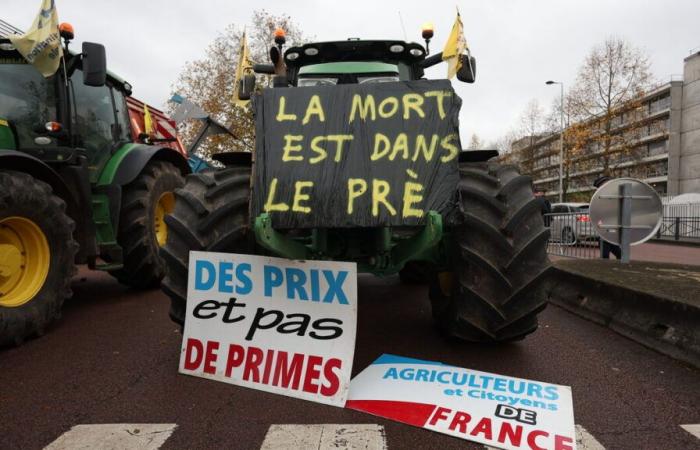New actions in perspective. Mercosur, “impediments” and “standards”: in a tense climate, a few weeks before their professional elections, farmers are preparing to enter a second week of mobilization, still in dispersed order but determined to maintain pressure on the government .
- Targeted actions for the FNSEA and Young Farmers
As of last Wednesday, the president of the FNSEA, Arnaud Rousseau, announced new actions with the Young Farmers (JA) “Tuesday, Wednesday and Thursday” to “denounce the obstacles to agriculture and everything that today constrains our activity “.
After symbolic actions – fires of anger, rallies – claimed in 85 departments, the actions will target for example prefectures, water agencies or the office of the French Office for Biodiversity (OFB). “Almost all departments plan to take action in the coming days,” warned the JA.
Following the FNSEA's credo – “No ban without solution” – the demonstrators will notably defend the return of acetamiprid, an insecticide from the neonicotinoid family, demanded by hazelnut and sugar beet producers. Harmful to pollinators, it is banned in France but used in other countries of the European Union. They also demand increased access to water and the simplification of the millefeuille of French and European standards, deeming the efforts made by the government still insufficient.
- An “amplified” movement for rural coordination
The Rural Coordination, which has multiplied its splashes in recent days, plans to “amplify” its mobilization beyond the South-West where its actions have been concentrated until now.
After a filter barrier at the Spanish border, the blockade of the commercial port of Bordeaux or a muscular intrusion into an office of the OFB, of which it demands the “dissolution”, the union plans a mobilization in a supermarket in Essonne on Monday. For Tuesday, the Rural Coordination is organizing an anti-Mercosur action in Dordogne, a rally in front of the European Parliament in Strasbourg but also a ditch cleaning operation in the Hautes-Alpes and the continuation of the blocking of distributors' purchasing centers.
Opposed for decades to free trade, the Peasant Confederation, heir to the anti-globalization peasant struggles, continues its mobilizations against Mercosur and “for the defense of peasant income” and the agroecological transition.
- Mercosur, not the only subject of concern
Less than a year after a historic mobilization and after a “rotten summer” marked by poor harvests and an outbreak of emerging animal diseases, the agricultural unions brought out the tractors, believing that they had not obtained enough concrete progress in the farmyard. If the first week focused on the free trade treaty that the European Union is negotiating with the Latin American countries of Mercosur, the actions will broaden to the denunciation of “impediments” to production.
In this tense climate, where the risk of overbidding is scrutinized by political observers, the government ensures that France is making progress in building a blocking minority in the EU-Mercosur agreement: after Italy, Poland has expressed its rejection on Friday. The French Minister of Agriculture, Annie Genevard, has also promised to tackle the issue of banned pesticides and new announcements in the coming days on “simplification”.






